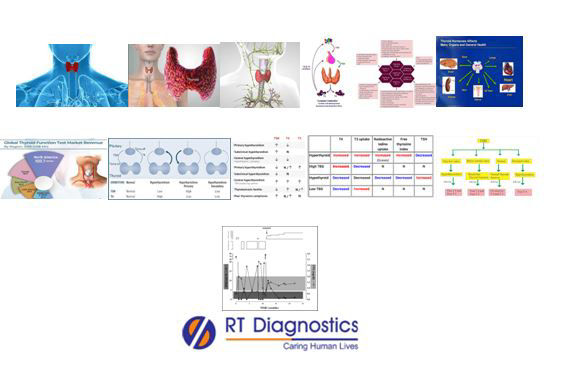Thyroid Function Test:
Why Thyroid Function Test?
CLINICAL INFORMATION
The thyroid gland is a small butterfly-shaped endocrine gland present in the front of the neck (below the voice-box). The thyroid gland secretes thyroid hormones into the blood which helps to reach target tissues. Thyroid hormones (T3 and T4) play a key role in many body functions like BMR, digestion, fertility, growth, heart rate etc. The thyroid gland helps regulate metabolism through the synthesis of thyroid hormones. It regulates metabolism through the production of thyroid hormones T3 and T4. Clinical manifestations of an under-active thyroid include – digestive problems including constipation, problems in menstruation (in women), tiredness and lack of energy, dry hair and skin, swelling around the eyes, and frequent feeling of being cold, weight gain, depression, forgetfulness, joint pains etc. Signs and symptoms of an overactive thyroid include – feeling weak and tired, trembling of hands and fingers, weight loss, anxiety, nervousness, irritability, sweating heavy, fast and irregular heartbeat, low tolerance for heat etc. Thyroid function tests are a series of blood tests used to measure the thyroid hormone (TSH, T3 and T4) and other associated parameters that influence the thyroid profile in the body such as TSH, TRH, iodine, autoantibodies against the thyroid gland (resulting in altered thyroid activity than normal), thyroglobulin, thyroglobulin antibodies etc. TRH triggers the TSH to secrete T3 and T4 hormones. Alteration in TSH levels serves as early warning signs before manifesting in any abnormal thyroid hormone secretions. High TSH levels indicate hypothyroidism and likewise, low TSH is a sign of hyperthyroidism. T4 or thyroxine (tetra-iodothyronine) is the main thyroid hormone circulating in the blood. Thyroxine test measures the number of free T4 (free T4 index, can be checked with TSH eg. high TSH with low T4 indicates primary hypothyroidism, thus pituitary function needs to be assessed for TRH etc) and total T4 (bound form). Likewise, hyperthyroidism can be detected by high T4 and low TSH levels in the blood. T3 (tri-iodothyronine is obtained by de-iodination from thyroxine T4. Test for T3 helps in the diagnosis of severity of hyperthyroidism. While in hypothyroidism T3 may not be useful since it remains within the normal range (this is not reliable), hence high TSH and low T4 are indicators for hypothyroidism. Reverse T3 is a biologically inactive form. Here the iodination of T3 occurs in a different locations compared with the active T3 hormone, hence remaining in an inactive form. This reverse T3 is not clinically useful for the diagnosis of hypothyroidism or hyperthyroidism. Anti-thyroid antibodies are tested for auto-antibodies against thyroid cell proteins, eg. thyroglobulin antibody, thyroid peroxidase antibody etc. Positive test results for anti-thyroid peroxidase and/or anti-thyroglobulin antibodies in patients with hypothyroidism may indicate the presence of Hashimoto’s thyroiditis. A positive auto-antibody test may be diagnosed for Graves’ disease in patients with hyperthyroidism. Thus, in Graves’ disease, these auto-antibodies act on the TSH receptors hence resulting in hyperthyroidism. Further additional tests are also indicated in patients who tested positive for Graves’ disease such as the thyrotropin receptor antibody test which detects stimulatory or blocking antibodies. The thyroglobulin test is not in the panel of the Thyroid function test, but it can be performed in patients who had undergone thyroidectomy for thyroid cancer patients. Other biological that may interfere with thyroid function tests are biotin and estrogen (in females). Additional tests include clinical assessment for enlarged thyroid – thyroid nodule, thyroid cancer, goitre etc, iodine test, TRH test, TSH test, thyroglobulin test, autoantibodies against the thyroid, anti-thyroglobulin antibody test (TgAb) etc. Other tests include ultrasound of the neck and imaging studies etc.

General Instructions:
Sample Requirement: Specimen - Blood sample collected from the vein. Test Preparation: None.
NOTE - Sample for specimen collections may vary based on the patient’s condition/cases according to the patient’s presenting complaints/signs or symptoms:
SPECIMEN REQUIREMENT (Special or Rare Cases) - As instructed and guided by Physician / Clinician / Pathologist / as per Laboratory’s requirements, according to procedures and protocols.
This Multi-Specialty Clinical Referral Laboratory RT DIAGNOSTICS provides precise and accurate tests with an extensive range of testing services to the medical centres to help in the diagnosis and identification of pathology in the test specimens for infectious diseases and also to evaluate the function of organ systems of the patient. It prevents further complications and helps to stabilize and restore health to near normalcy at the earliest without delay.



